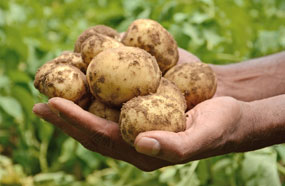Our Potatoes
Solanum International uses their extensive industry knowledge to identify and select the best potato varieties. Most of these varieties have been grown and tested in Europe prior to introduction in North America but some are simultaneously introduced by the breeder and Solanum International on both continents.
Quality potato variety selection includes the following:
- Higher yielding varieties
- Proper skin finish
- Great tasting and excellent cooking qualities
- Drought and heat tolerant
- Resistance to common viruses and diseases
- Good storability
- Higher fresh pack-out
- Niche and specialty market

Our Seed Potatoes
Our seed growers are applying the latest agricultural practices to produce the highest quality seed possible. We focus on delivering high grade, virus free seed, with optimum size profile so that our customers can maximize productivity at their end. Field Readings and Post Harvest Test (PHT) results available upon request.

For Breeders
Solanum International provides a unique entry into the North American potato market. Our European cultural and farming background in combination with over twenty years of Canadian seed potato production, provide our breeders with a capable partner for entry into this market.

For Marketers
Solanum International works closely together with our marketing partners to develop new opportunities by providing alternatives to conventional North American potato varieties. We focus on growing trends in organics, specialties, and yellow fleshed varieties using mainly European varieties that are selected, among many other traits, for higher yields, better taste, and nicer skin finish. Our varieties help our marketers increase their competitive edge and market position in a sustainable and profitable way.

For Consumers
The potato market is always changing to consumer demands and preferences. It is important to provide the consumer with a product that not only meets and exceeds quality expectations and taste, but does so in a responsible and sustainable way. We do this by working with varieties that require less growing inputs, produce higher yields and have less wastage.